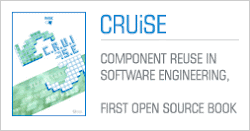 Now in its 13th year, the International Software Product Line Conference (SPLC) 2009 was held August 24 – 28 in San Francisco, California. In this edition, the presence of industrial and academy people was remarkable, resulting in more than 150 attendees. Practitioners and researchers from different countries had the opportunity to discuss hot topics regarding to Software Product Lines area.
Now in its 13th year, the International Software Product Line Conference (SPLC) 2009 was held August 24 – 28 in San Francisco, California. In this edition, the presence of industrial and academy people was remarkable, resulting in more than 150 attendees. Practitioners and researchers from different countries had the opportunity to discuss hot topics regarding to Software Product Lines area. ey start showing the problems when modeling scalable systems, for example, size, complexity, distributed environment, long life cycle and multiple stakeholders. In SPL context the main problems are variability management, configuration management, model based development and complicated development style. Later, the Service-Oriented Architectures and Software Product Lines (SOAPL) which was marked with the presence of the RiSE group represented by Flavio Medeiros, presenting the paper entitled "Towards an Approach for Service-Oriented Product Line Architectures".
ey start showing the problems when modeling scalable systems, for example, size, complexity, distributed environment, long life cycle and multiple stakeholders. In SPL context the main problems are variability management, configuration management, model based development and complicated development style. Later, the Service-Oriented Architectures and Software Product Lines (SOAPL) which was marked with the presence of the RiSE group represented by Flavio Medeiros, presenting the paper entitled "Towards an Approach for Service-Oriented Product Line Architectures".On Wednesday, the first keynote speaker, Richard Gabriel from IBM discuss the about "Science is Not Enough: On Creation of Software", which presented a different perspective in the field. His talk was a mix between a talk and lecture including the strong relationship with arts. During this day, papers regarding to configuration, scoping and variability were presented and discussed.
On Thursday, the second keynote speaker, Jacob G. Refstrup - lead architect for the Owen software product line architecture from HP - which is used across multiple inkjet product families. He talked about "Adapting to Change: Architecture, Processes and Tools: a closer look at HP's Experience in Evolving the Owen Software Product Line".
On Friday,
 the last keynote speaker, Kyo Chul Kang presents the "FODA: Twenty Years ofk for feature analysis and simple but comprehensive way to modeling commonalities and variabilities. He also report the remaining problems of it, for example, addressing other parts of the life cycle (especially application engineering), clear the mapping between Perspective on Feature Models". Kyo shows that FODA has approximately 1300 citations, highlighting the importance of it. He presents as main contributions of FODA: systematic domain analysis, lying the groundworfeatures and software artifacts, standardization of feature model extensions, trade-offs between expressiveness and simplicity, scalability of feature model, managing complexity in view of many inter-dependent features, feature model evaluation and integration with UML model.
the last keynote speaker, Kyo Chul Kang presents the "FODA: Twenty Years ofk for feature analysis and simple but comprehensive way to modeling commonalities and variabilities. He also report the remaining problems of it, for example, addressing other parts of the life cycle (especially application engineering), clear the mapping between Perspective on Feature Models". Kyo shows that FODA has approximately 1300 citations, highlighting the importance of it. He presents as main contributions of FODA: systematic domain analysis, lying the groundworfeatures and software artifacts, standardization of feature model extensions, trade-offs between expressiveness and simplicity, scalability of feature model, managing complexity in view of many inter-dependent features, feature model evaluation and integration with UML model.During this day the Goldfish Panel "How to Maximize Business Return of Software Product Line Development", had the presence of the most renowned researchers in the area as John D. McGregor, Dirk Murthig, David M. Weiss, Klaus Smith, Jan Bosch, Charles Krueger and Eduardo Almeida, which put in discussion the Brazilians company reality, reporting that they have not a specific domain and asking how is the best way to introduce the SPL approach in these companies. Others issues to think about were discussed as: Is it worthwhile at all?, What are the three top-most value-generating activities?, How to recognize where to focus efforts? (subsystem, functionality,..) and What was your worst ever product line experience?
Finally, the waiting hall of fame was presented by David Weiss showing the results of the evaluation from 2008 and presented the candidates for 2009. Two new companies were trying to have her names in the hall of fame, the TomTom company presents a GPS software product line and Lockeed Martin . In the end, the TomTom was nominated and will be evaluated during this year. The results will be available in the next SPLC 2010 held in Korea.





